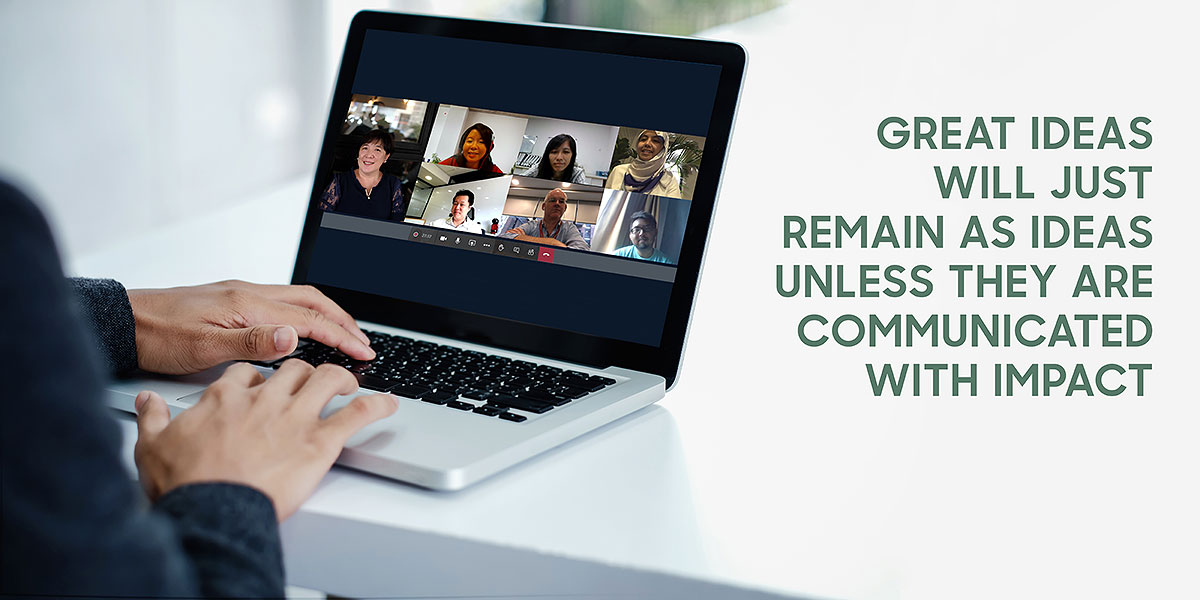Copyright © 2020 Gamuda Berhad
by Sheena Wong
Gamuda’s English Language Unit (ELU) and the Group Corporate Communications and Sustainability Department (GCCS) collaborated in organising the second annual English Writing Contest, themed ‘Sustainability, the Savvy Way’.
The contest was launched on the English Language Day and the World Book and Copyright Day, 23 April 2020.
It ran over a month and received a good mix of entries across the Group’s departments and projects, as sustainability is an overarching subject that applies to all.
Incorporating ‘Sustainability’ as a common theme stemmed from a coffee discussion between the ELU Head, Dr Ho Sook Wah and GCCS General Manager and Chief Sustainability Officer, Ong Jee Lian.
The collaboration was to kill two birds with one stone.
The ELU wanted to provide an avenue for Gamudians to write in English on a theme important to the Group, while GCCS wished to weave the interest of sustainability among staff members.
Ultimately, the contest hoped to seek feasible ideas for Gamudians to walk the talk on sustainability at a personal and professional level.
A panel of seven judges, including Dr Ho and Jee Lian, was mindfully selected to represent all sides of the business.

Copyright © 2020 Gamuda Berhad
The judges reviewed the entries for eventual implementation; hence, clearly articulated ideas are the key to writing for the judges to understand the proposed ideas and weigh the practicality to operationalise them.
In the process, the judges found sound suggestions to integrate sustainability, especially in construction operation, procurement processes and utilities usage habits.
Sustainability is certainly a mindset change. This is the common notion that Jee Lian gathered from all the submissions.
“It is heartening to see the writers understood the fundamentals of sustainability, and how the pandemic situation opened their eyes to the fact that the planet lies in balance with profit and people,” she said.
Many of the contest writers highlighted the importance of mindset change in personal habits and work processes, and practising ‘integrity’ to do what is right even when no one is looking.
“These reflect the ESG (environment, social and governance) fundamentals, which the writers understood. Many highlighted that it’s necessary to lead a change in the built environment and use fewer natural resources,” added Jee Lian.
Some of the submissions advocated implementing sustainable practices and using technologies to streamline business operations. Regulation compliance would help to kick start the process.
The actionable ideas will be explored for implementation, such as the use of chatbot algorithm for document control process, dashboard that displays utility usage and wastage in monetary value to induce behavioural change among employees.
The judges scored the submissions based on five writing criteria, i.e. content, relevance to theme, coherence and writing structure, language use and succinct communication.
“Generally, all the writers were able to express their ideas, but we found that some would still need to work on communicating with more impact by structuring their ideas more cohesively and coherently,” Dr Ho observed.
She opined that Gamudians should leverage on the writing contest as a platform to hone their writing skills.
The ELU would look at offering writing workshops for aspiring writers.
Gamuda Engineering General Manager, Tan Ek Khai noted many participants brought up the fact that sustainability is about changing human behaviours.
He urged to keep the writing simple and that ‘less is more’ when trying to present their ideas more effectively, which is a crucial skill at work.
Gamuda Parks Chief Operating Officer, Khariza Abdul Khalid stressed that while promoting sustainability is a long journey, writing is a great way to engage people’s interest, especially in the area of biodiversity.
ELU Manager, Pauline Teo, commended on the participants’ efforts as it takes tremendous courage to write for a contest.
She pointed out that it boils down to a lot of reading, researching and understanding of the topic before one could start writing.
Head of Project Information Management, Ronan Collins hoped some of the great ideas could be elaborated upon further. He expected to see a more detailed discussion on the pros and cons of an idea to sum up the written piece comprehensively.
Group Sustainability Manager, Venu Mahendra expressed the need for writing to generate a good first and last impression.
Before any writing commences, the thought process must be in place to ensure logic and consistency throughout the essay, while having a meaningful flow of points.
In summarising the key takeaways from the judges, Dr Ho reiterated the importance of writing to serve a purpose, with the reader in mind.
“In essence, an impactful writing piece should be cohesive, coherent and engaging,” she said.
“Great ideas will just remain as ideas unless they are communicated with impact. Having a good command of English gives us that edge,” she added.
 What does sustainability mean to you at work, in your daily life or even during the current COVID-19 pandemic? How can you make sustainability part of your lifestyle, both personally and professionally?
What does sustainability mean to you at work, in your daily life or even during the current COVID-19 pandemic? How can you make sustainability part of your lifestyle, both personally and professionally?by STANISLAUS ROSHAN ANTHONYSAMY
We spend more hours at our work places than at our homes; therefore, our contribution to sustainability should be relatively more when we are commuting to and from work, and when we are at work. The COVID-19 pandemic has awakened us to some realities that will become our new normal, and how we could contribute at a personal level, and as a business organisation.
The pandemic has prevented us from frequent ride-sharing or the use of public transport for fear of contracting the virus; therefore, unless we are absolutely required physically at our work locations, working from home remains a more sustainable solution. To those who work from the office or work sites, the use of web applications for remote meetings will now be increasingly utilised to engage all stakeholders; this eliminates the need to travel, minimises the need to be in close proximity, and contributes directly to lesser air pollution caused by commuting. In only just a few weeks of the movement control order around the world, our planet has begun to heal itself; heavy dense fogs that became part of the ‘normal’ in some cities due to excessive pollution from cars and factories have now disappeared, and polluted rivers and lakes which were said to be impossible to be cleaned have ‘cleaned’ themselves as man-made pollution has been drastically decreased the pandemic quarantine. The anxious request on every Earth Day Celebration for the past 50 years to implement one day in the world with no vehicles on the road has, unfortunately or fortunately, come to pass via a pandemic, and this has proven that we actually can make a difference to the environment if we had wanted to, by not driving or stopping the factories for a few days.
The pandemic has also opened our eyes to so many people who live hand to mouth and/or have lost their source of income as a result of the movement control order. These people are now suffering without being able to afford food while others throw away good food on a daily basis. Malaysia’s daily food waste is about 17,000 tonnes; this can feed approximately 12 million people three times a day. These staggering numbers should be an eye opener to us. Thus, it is comforting to know that many organisations in Malaysia such as Robin Food, Grub Cycle, Lost Food Project and the like have been formed by sustainability conscious founders to collect food that would otherwise have gone to waste to be redistributed to the needy. At a personal level, I am doing my part by ensuring that food consumption and raw food procurement in my house hold is limited to only what is required, and that we are conscious about those who are suffering to feed themselves and their families on a daily basis. I also believe in doing my part in reaching out and helping through these food collection agencies whenever there is food to spare; a simple phone call to any of these food collection organisations is all that it takes to make a difference in providing sustenance to a fellow human being.
As a company, Gamuda can contribute to sustainability through the use of a dashboard that shows us in Ringgit and Sen the daily usage of plastic for waste paper baskets, lights replaced, air conditioner power usage, water usage, stationary usage, printer paper usage, etc. When employees actually see the monetary value of the waste that they are contributing to, they will subconsciously help reduce this waste whenever and wherever they can. In addition, Gamuda can reach out to its employees during major celebrations of Hari Raya, Chinese New Year, Deepavali and Christmas to utilise the services of food collection agencies as food wastage during festivities is the highest. Having employees volunteer with these food collection agencies as part of Gamuda’s Corporate Social Responsibility activity can further instil the value of giving whatever extra we have.
Gamuda can further align with the UN’s Industry and Infrastructure sustainability goal by engaging with our Original Equipment Manufacturers (OEMs) to ensure that they provide products that require minimal maintenance i.e. a robust design and mechanics utilising ethically sourced parts and sustainable consumables. This will ensure end products that are profitable in every way to our clients. Sustainable innovation like the innovation in battery technology that is increasingly being improved to harness power and to disperse it economically has the potential to be developed further to power vehicles, households, trains, train stations, and E&M systems like lifts and escalators. The world is moving away from dependence on finite fossil fuels towards cleaner and healthier alternatives.
I believe that there are more than enough resources in this world to provide for each and every person and animal in this world. It is due to our excesses that resources are not equally distributed or are not protected. There is still not enough practical education on the subject of “sustainability” in schools and in institutions of higher learning. A paradigm shift in the way that we see our country, home and office like Norway’s ban on deforestation, Japan’s recycling programme and Finland’s renewable energy programme are examples of what is needed for us to respect what we take for granted, and to spark the fire of innovation in our young adults to continue to seek new ways to live a better and sustainable life.
 What does sustainability mean to you at work, in your daily life or even during the current COVID-19 pandemic? How can you make sustainability part of your lifestyle, both personally and professionally?
What does sustainability mean to you at work, in your daily life or even during the current COVID-19 pandemic? How can you make sustainability part of your lifestyle, both personally and professionally?by BHALDEV SINGH A/L HARBANS SINGH
More often than not, you would have heard the word ‘Sustainability’ being thrown around almost everywhere – at your workplace, some random advertisement on television, in your company’s policy or even at the grocery store. In recent years, sustainability has become a very important aspect of everyday life, with a push for it to be adopted and be made part of our DNA. By definition, sustainability means maintaining something at a certain rate, not complete depletion. But here’s the catch: sustainability has always been part of us. Early mankind settlements located nearby food and water source, crops planted all for the purpose of continuing the species, and our fight-or-flight mechanism are all characteristics of sustainable practices.
The question then arises: if we are already a sustainable species, why is there still the need for mass calls on adopting a sustainable lifestyle? Well, it seems we, as a species, are only sustainable when it comes to our needs while ignoring the needs of others and the future. When we look at it this way, we realized that these are selective sustainable practices. With the advancement of society, one needs to realise mankind needs to be sustainable in many different aspects to make it count. Hence, we would have to modify our native instinct to suit current times but this, of course, is easier said than done.
The most effective way, to me, would be to teach our kids on how to be sustainable. Although many have refuted the proverb ‘You cannot teach an old dog new tricks’, saying the brain is still able to learn new things regardless of age, there is some degree of truth to the saying. The older generation is less prone to accept changes due to the foreign nature of change to them, whereas for the younger generation, it is easier to adopt new values and ideas. Also, it would help to explain the potential effects of sustainable practice on the world to make the younger generation realise that sustainability and the future are not different but intertwined. Sustainability awareness which has been widespread in these past few years is beginning to show its effects; many of the new technologies that promote sustainability are more often than not the brainchild of the younger generation.
The next step to make sustainability the norm would be by introducing regulations to society. Although regulations are often perceived as negative due to their association with coercing, we can already see their positive effects. In Malaysia, supermarkets have begun charging a fee of 20 sen per plastic bag. At first, people saw it as a nuisance and would pay that 20 sen, mocking that it was a pointless effort. Now, we see more and more shoppers bringing their own recyclable bags. Also, a company’s compliance to regulations set by the authorities is a huge step towards the sustainability movement. For example, MMC-Gamuda’s tunnelling sites require their muck disposing sub-contractors to comply with all the regulations for safe disposal and not engage in unlawful practices such as illegal dumping. A lot of new government regulations are now moving towards sustainability goals; this will definitely help to shape the landscape of sustainability.
When you remove a variable from an equation, the equation needs a substitute; otherwise, it becomes unbalanced. This same principle applies to all areas of our life. When something is banned or prohibited, we need to look at how we can replace it sustainably, or else it will just be a matter of time till something non-sustainable pops up and takes its place. For example, many eateries and fast food joints are joining the call to discourage the use of plastic straws or to ban them altogether. This, of course, is an applauded move, but sometimes you do need a straw for convenience. This is where McDonalds showed us a simple but effective innovation. They redesigned their cups so that a straw is no longer needed for drinking – simple but effective. This shows that innovation and creativity above all else, will help us smoothly transition to a more sustainable lifestyle. Inventions does not necessarily have to be space rocket science; it can sometimes be as simple as a plastic bag. The new biodegradable plastic bags introduced across all shopping malls and groceries stores have helped in two ways. First, they are biodegradable, so they do not pollute as much. Second, they are not as strong as regular plastic bags; hence, more people are opting out of this single use plastic practice. There have been many inventions like this across the globe: a sea wave-powered garbage collector; Life Straw, a device which can quickly filter unsafe water for drinking; edible cutleries which reduce water wastage and trash production.
Lastly, encouraging new innovation and technology which goes hand-in-hand with sustainability, needs to be boosted. Without proper backing and funding, a lot of ground-breaking ideas that otherwise could have made a difference, will never take off. This is where government agencies and the private sector should come in and take the lead. We are already seeing a lot of these, and it is nice knowing that private companies are willing to contribute to a greater cause.
We have come so far in these last 10 years, from sustainability being a foreign word to it being implemented everywhere. Who knows, in the next 10 years, there would not be a need for any discussion on how to implement sustainability; it would have been embedded in our lifestyle. One can be hopeful.
 Gamuda is aligned with the United Nations 17 Sustainable Development Goals (UNSDGs). Suggest and describe how our work areas (i.e. design, construction, contracts and procurement, communications, marketing, operation and facilities management, HR and training, finance, audit, QSHE) can be integrated with the UNSDGs.
Gamuda is aligned with the United Nations 17 Sustainable Development Goals (UNSDGs). Suggest and describe how our work areas (i.e. design, construction, contracts and procurement, communications, marketing, operation and facilities management, HR and training, finance, audit, QSHE) can be integrated with the UNSDGs.by CHIN TOAK PINK
The UNSDG, being part of the 2030 Agenda, is a collection of 17 goals aimed at providing a shared blueprint for peace and prosperity for people and the planet, now and into the future. But as Michael Green, rhetorically questioned our chances of meeting the global goals in one of the TED Talks , he concluded by saying, “Certainly not with business as usual. Even a flood tide of economic growth is not going to get us there.”
Indeed, sustainability and businesses are no longer separable as issues of climate change continue to dominate science reports, with global warning attributable to disasters and diseases around the world. Gamuda’s trajectory towards sustainable development is not an option, but a necessity to lead a change in the built environment plagued with high energy consumption and resource wastage.
I believe a successful integration of our existing work areas to the UNSDGs does not necessarily call for exorbitant investment into technologies or innovations that fundamentally change our operation. Of all the 17 UNSDGs involved, most start with a call for a sense of compassion to the well-being of the people and the planet in the face of societal crisis. It is therefore important for an organisation such as ours to recognise issues prompting UN’s 17 sustainable goals. Perhaps implementing sustainability as one of our core values can solidify our emphasis to carry ourselves towards sustainable development.
In our human resource and people engagement, sustainability awareness must be created at all levels of our people through constructive activities. For example, in this very writing contest, (the Gamuda English Writing Contest) one may not walk away with any prizes, but the takeaway for that person is a greater awareness of the UNSDGs and how they guide one to live without sacrificing the needs of the future generation. Another great example of constructive activities is the recently concluded “InfraChallenge” competition hosted by Gihub & MIT Solve; it showed that competitions with social impact themes can spur great ideas and positive development. We should, therefore, continue to engage our people in activities that adopt a strong sense of sustainability in our daily lives.
In training our people, I opine that most of our existing training modules, whether technical or leadership in nature, shall make reference to sustainable development. For instance, in introducing digital technologies like BIM or IBS, in addition to highlighting enhanced work efficiency, learners must also be informed that the same technologies essentially address resource management as well as tackle housing shortage, both key topics in sustainability. In other words, we need to embrace that some of the things we do within our organisation are directly affiliated with sustainable development, instead treating sustainability as a by-product of developing towards competitiveness.
In the commercial aspect, we should actively participate in projects that principally build a nation towards sustainability, like the ones we successfully built our profile upon, for examples, SMART in response to flood, KVMRT in response to traffic congestion. Infrastructure is for the betterment of society basic needs; with our continual involvement in this sector, it is imperative that we demonstrate initiatives to improve this resource intensive industry. For instance, we should always present to our employer our tender proposals with key ideas of sustainability implementation. Regardless of the tender outcome, we will be seen as an organisation supporting the principle of sustainable development; this may positively help us in securing prospective projects demanding sustainability calibre.
Likewise, in our procurement of sub-contractors, we should make sustainability a condition before granting an award, for example, calling for sustainable solutions to complement our existing requirements. Prior to project award, we can also provide a platform to sub-contractors to educate them on the key criteria of sustainability as perceived by Gamuda under the UNSDGs framework. We have previously educated most, if not all our sub-contractors to transition their bid proposals electronically via SAP Ariba. This transition was evidently a success, and I can imagine a similar platform be introduced to build our sub-contractors to be more sustainable-minded, not just within our own projects but in all their project undertaking.
Next, Gamuda IBS is a very important gateway that opens up various sustainable potential. It is widely known that the IBS delivery is at the speed unmatched by the more traditional building delivery. In addition, IBS enables better control over resources to cut down wastage. To further propel sustainability in GIBS, I believe the key criteria is to develop systems or modules that serve more than a lifecycle. Take the Smart Brick whereby modular bricks can be assembled, potentially dismantled and re-assembled again for the next use, as an example. This adaptive re-use philosophy can be developed into our GIBS production in such a way that we may be able to fabricate modules capable of being re-used. For instance, we can rebuild our own site office in our new jobsite by using the dismantled modules which served the previous jobsite office. This is one way our business can contribute to the concept of circular economy .
The sustainable potential of GIBS can also be extended to residential building. Take Habitat 67 as an example; this brutalist landmark in Montreal is also a testament of how an inclusive residential community can be achieved through a pre-fabrication system. While it failed to revolutionise affordable housing envisioned by its designer, perhaps in the context of the UNSDGs, we can emulate the philosophy of social integration from Habitat 67 in our housing delivery through our GIBS business.
To sum up, most of our existing business practices should implement some degree of sustainability. Our vision to lead the region in innovative breakthrough solutions can be improved further by having sustainability as one of the target breakthroughs. This can be done by continuously engaging our people on the subject of sustainability, whether through competitions or training, etc. Commercially, we should always project ourselves as proponent of sustainability, with sincere motivation to make the world a better place, and I believe employers across the built environment expect no less from us when it comes to achieving sustainability. We can play a role through our procurement to create a more sustainable supply chain. Our GIBS can develop modules with adaptive re-use philosophy in mind in order to contribute to the circular economy. In addition, house building by GIBS can lean more towards social integration. I believe these are some examples of small steps to move our work processes and cultures an inch closer to the UNSDGs, and it all starts with rejecting “business as usual” and doing things differently.
